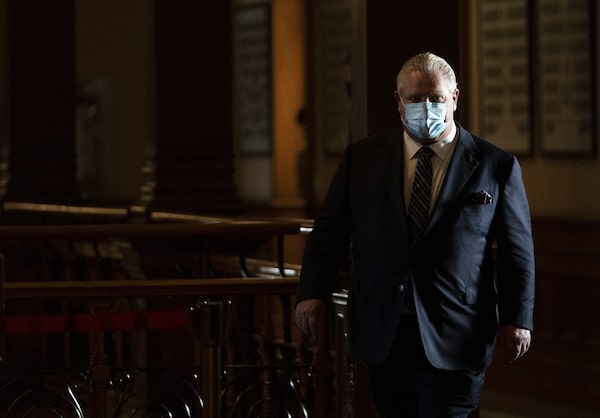
Ontario Premier Doug Ford has been keeping a low profile, insisting that acts of civil disobedience must end, but letting Prime Minister Justin Trudeau take the lead, John Ibbitson writes.Nathan Denette/The Canadian Press
Ontario is in turmoil from one end of the province to the other – from a blockade in Windsor to trucker protests in Ottawa. But those disturbances are unlikely to reshape the outcome of the June 2 provincial election.
Progressive Conservative Premier Doug Ford appears to be pursuing the politically astute tactic of shifting responsibility to the federal government, while at the same time not alienating voters who may share the protesters’ opposition to pandemic restrictions. It could help him get re-elected.
The Premier has been keeping a low profile, insisting that acts of civil disobedience must end, but letting Prime Minister Justin Trudeau take the lead – that is, the heat – in resolving the situation. Their phone call Wednesday night appeared to produce no more than supportive tweets, though the province was successful at getting a court to freeze access to donations the protesters have collected on the online fundraising platform GiveSendGo.
The Doug Ford government has a plan to lower housing prices – by growing up
Provincial officials aren’t even bothering to show up for trilateral meetings the federal government wants to convene with the province and the city to discuss the Ottawa protests, saying they’re a waste of time.
Mr. Ford has avoided the Prime Minister’s ill-advised tendency to dismiss people who resist pandemic measures as “misogynists” and “racists” – a “fringe minority,” who hold “unacceptable views.”
Though if the protesters are angry at anyone, it should be Mr. Ford. Most of the pandemic restrictions they oppose are provincially mandated. And, while Alberta and Saskatchewan are exiting the Omicron lockdown swiftly, Mr. Ford’s government is taking a more cautious approach.
But instead of blaming Queen’s Park, the protesters have targeted Parliament Hill.
“There’s a lot of research that shows that Canadians generally have trouble attributing blame and credit across levels” of government, said Christopher Alcantara, a political scientist at the University of Western Ontario whose research includes intergovernmental relations.
Despite the protests, “I think Doug Ford will get re-elected,” he told me.
Nelson Wiseman, a professor emeritus at the University of Toronto who has long studied politics in Ontario, agrees. “If I were betting right now, I would say he would have a narrow majority” after the election, he said.
The Tories have a lock on rural Ontario, while the Liberals and the NDP battle for the downtowns. But as everyone knows, voters in the suburban ridings that dominate the province elect the government.
Mr. Ford’s aw-shucks brand of mildly populist but mostly pragmatic conservatism seems to appeal to those voters. Polls generally show the Progressive Conservatives on the cusp of, but not securely inside, majority-government territory, with Andrea Horwath’s NDP and Steven Del Duca’s Liberals – who were shellacked in the last election – more or less tied for second place.
That’s far from a slam-dunk for the PCs, especially if the progressive vote coalesces around either the Liberals or the NDP, and especially since both opposition leaders say they would never support a PC minority government.
But that could work to Mr. Ford’s advantage, winning over swing voters to the PCs while the NDP and Liberals fight each other for second place.
After a rocky beginning, marred by temper tantrums, dictatorial behaviour and a futile fight against the federal carbon tax, Mr. Ford’s government has settled down. The province has gotten through the pandemic no worse than most places, and better than some.
Mr. Ford has paid close attention to the needs of those all-important suburban voters. His championing of two planned major highways on the edge of Greater Toronto has earned the condemnation of environmentalists, but will be welcomed by car commuters.
Mr. Wiseman says he believes that, by spring, memories of the pandemic will be receding, the blockades and protests will be ancient history, and provincial voters will opt for the moderate conservatism they could expect from a second Ford government.
There is, however, a caveat. The pandemic may leave deeper, more permanent scars on the population than we expect. An electorate embittered by years of periodic lockdowns, economic insecurity, rising inflation and a ridiculously hot housing market may lash out at the Progressive Conservatives as the architects of their misery.
But barring such a backlash, a plurality of Ontario voters are likely to stick with Mr. Ford for a second round, protests and pandemics notwithstanding.
For subscribers: Get exclusive political news and analysis by signing up for the Politics Briefing.
 John Ibbitson
John Ibbitson